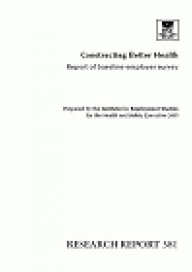Publications
 We author and publish a range of resources to keep you up to date with the latest developments in employment, labour market and human resource policy and practice.
We author and publish a range of resources to keep you up to date with the latest developments in employment, labour market and human resource policy and practice.
All our pdf publications are free to access.
Search results
-
📄
Learning at Work: Strategies for Widening Adult Participation in Learning Below Level 2 via the Workplace
A Scoping Study
Bates P, Hunt W, Hillage J | Sep 2005 | Learning and Skills Development AgencyThis report presents the findings of a scoping study into initiatives, methods and approaches designed to encourage a widening of participation in below Level 2 adult learning via the workplace. This publication is no longer available.
-

Constructing Better Health - Report of Baseline Employer Survey
Sinclair A, Tyers C | Sep 2005 | Health and Safety ExecutiveThis report presents the findings of the first of a series of research activities carried out to evaluate the Constructing Better Health (CBH) pilot scheme, a construction industry-led occupational health support pilot, facilitated by the Health and Safety Executive (HSE) and the Health and Safety Commission (HSC). The report presents the results of the baseline wave of a survey of 2,000 employers and sole traders working in construction within the Leicestershire, Nottinghamshire and Avon areas.
-

Sectors Matter
An International Study of Sector Skills and Productivity
Jagger N, Nesta L, Gerova V, Patel P | Sep 2005 | Sector Skills Development AgencyThis report details the results of a project undertaken jointly by IES and the Science Policy Research Unit. The project developed a range of skills indicators and calculated total factor productivity growth, which is a productivity measure that takes account of hours worked and capital input.
-
📄
Appreciative Enquiry
a Practical Guide
Newton B, Hartley V | Aug 2005 | Institute for Employment StudiesThis paper provides a practical overview of appreciative enquiry, the processes involved and the outcomes of managers and HR practitioners using it in their own organisations. On the strength of the authors' knowledge and experience, they have put together suggestions of situations where appreciative enquiry is particularly applicable.
-
📄
CSR: Doing Good or Doing Good Business?
Barber L, Wolfe H | Aug 2005 | Institute for Employment StudiesThe author discusses the history of CSR, and drivers behind it, and outlines what HR professionals have to offer in delivering their organisation's CSR agenda.
-

Planning Training for Your Business
Hirsh W, Tamkin P | Aug 2005 | Institute for Employment StudiesThe IES research summarised in this report used nine case studies to investigate how organisations plan their training and development activities, how training budgets are managed and where they sit, which processes are used to link training with business needs and how effectively these appear to operate.
-
📄
Review of the Reporting of Accidents and Incidents Involving Learners
Miller L, Ballard J, Suff P, Bates P, Hurstfield J, Akroyd K | Aug 2005 | Institute for Employment StudiesThe research aimed to identify factors that might contribute to under-reporting of accidents and incidents of learners, primarily apprentices and those on entry to employment programmes. It consisted of a literature review, interviews with the Learning and Skills Council regional health and safety managers, a review of the data on accident reports, focus groups with learners, a survey of learning providers and a survey of employers.
-
📄
Your Call
Managing Reward and Performance in Call Centres
Suff P, Reilly P, Mercer M | Aug 2005 | Institute for Employment StudiesIn the early 2000s the UK call centre industry employed around 850,000 workers in more than 6,000 centres. And although there were fears that 'offshoring' - that is, moving operations to lower-cost countries, such as India and South Africa - would lead to a fall in employment levels, the UK industry continued to expand. A report commissioned by the Department of Trade and Industry (DTI) found in 2003 that employment in the UK call centre industry had risen by 250 per cent since 1995, and was continuing to add tens of thousands of agent positions each year.
-

Whither Performance Management?
Ward A | Aug 2005 | Institute for Employment StudiesAlthough it is a concept that has commanded considerable attention from academics, researchers and practitioners alike over the past ten to twenty years, performance management retains much of its 'grail' type quality for many organisations. In spite of its many iterations, designing, implementing and applying a performance management process that both adds value to business performance and creates a developmental, satisfying and rewarding place to work continues to challenge each layer of management and its HR partners.
-
📄
Final Outcomes from the Permitted Work Rules
Dewson S, Davis S, Loukas G | Jul 2005 | Department for Work and PensionsThe permitted work rules (PWR) were introduced in April 2002 and replaced the existing provisions, commonly known as therapeutic work (TW). This report presents the findings from a final wave of research at the end of a three-year evaluation of the permitted work rules undertaken by the Institute for Employment Studies (IES) in partnership with MORI.
